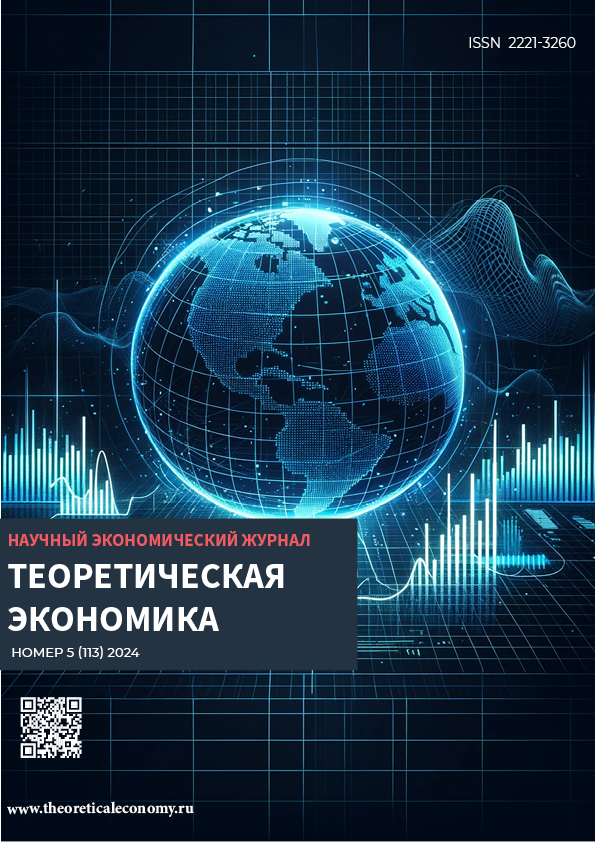St. Petersburg, St. Petersburg, Russian Federation
St. Petersburg, St. Petersburg, Russian Federation
The article is devoted to the study of methodological aspects of the formation of a system of training specialists in the field of economics. Many global problems related to climate change, loss of biodiversity and depletion of resources, growing inequality and concentration of power, and economic instability require solutions based on a different, deeper understanding of economics, which the modern system of economic education cannot fully provide. To get a good understanding of the economy and its problems, a number of approaches are needed, in which priority is given to various methodologies, assumptions, units of analysis and results. The purpose of the study is to localize the methodological aspects of the impact of economic risks on the system of training specialists in the field of economics and to develop recommendations for their identification and the formation of critical economic thinking based on data analysis. The object of the research is public institutions involved in the formation of a methodology for training specialists in the field of economics. The subject of the study is the mechanisms and methods used in the formation of a modern system of training specialists. In the course of the research, methods of description, analysis, formalization and regulatory monitoring were used. The article reveals the basic methodological approaches to the formation of a modern mechanism for training specialists, methodologically substantiates the expediency of applying new approaches to teaching and developing critical thinking skills. The discussed directions and mechanisms will allow to expand the areas of possible application of the system of training specialists in the field of economics.
Training system, global problems, economic risks, public institutions, regulatory monitoring, critical thinking
1. Earle J., Moran C., Ward-Perkins Z. The econocracy: the perils of leaving economics to the experts // Manchester University Press. – 2016.
2. Hayek F. The Nobel Banquet Speech. – 1974.
3. Akerlof G. A. The market for «lemons»: Quality uncertainty and the market mechanism. In Uncertainty in economics. - 1978. - (pp. 235-251). Elsevier.
4. Akerlof G. A. Sins of Omission and the Practice of Economics // Journal of Economic Literature. – 2020. - 58(2), 405-418.
5. Fourcade M., Healy K. Moral views of market society // Annual review of Sociology, 2007. - 33.
6. Fourcade M., Ollion E., Algan Y. The superiority of economists. Journal of economic perspectives, - 2015. - 29(1), r. 89-114.
7. Hardoon D., Fuentes-Nieva R., Ayele, S. An Economy for the 1%: How privilege and power in the economy drive extreme inequality and how this can be stopped // Oxfam International. – 2016. https://wwwcdn.oxfam.org/s3fs-public/file_attachments/bp210-economy-one-percent-taxhavens-180116-en_0.pdf.
8. Butler-Sloss S., Beckmann M. Economics journals’ engagement in the planetary emergency: a misallocation of resources? // Economists for Future. – 2021. https://econ4future.org/wp-content/ uploads/2021/04/economics-journals-engagement-in-the-planetary-emergency-v3.pdf.
9. Oswald A., Stern, N. Why are economists letting down the world on climate change // VoxEU. – 2019. https://voxeu.org/article/why-are-economists-letting-down-world-climate-change.
10. Mounk Y. The people vs. democracy: Why our freedom is in danger and how to save it // Harvard University Press. – 2018.
11. Groenewegen J. Teaching pluralism in economics // Edward Elgar Publishing. – 2007.
12. Schumpeter J. A. Capitalism, Socialism and Democracy // Columbia University Press. – 1942.
13. Sen A. // Sen, McCloskey, and the Future of Heterodox Economics [Interview] // Post-Autistic Economics Review. http://www.paecon.net/PAEReview/issue35/Garnett35.htm
14. Ostrom E. Governing the commons: The evolution of institutions for collective action // Cambridge University Press. – 1990.
15. Proctor J. C. Mapping Pluralist Research: An overview of research within the student movement for pluralism in economics // Oikos International. – 2019. https://cdn.oikos-international.org/intl/old/2019/03/ Mapping-Pluralist-Research-0319.pdf?fbclid=IwAR32UXbUMbF6YHAbv1WiO6iRgEv7ABCyEsR3VwSUr4CLj3r5PVAZZt9WIlE
16. Colander D., Klamer A. The making of an economist. Journal of economic perspectives. – 1987. - 1(2), - r. 95-111.
17. Ho K. Liquidated: an ethnography of Wall Street // Duke University Press. – 2009.
18. Girardi D., Mamunuru S. M., Halliday S. D., Bowles S. Does economics make you selfish? // UMass Amherst Economics Department Working Paper Series. – 2021.
19. Keynes J. M. Alfred Marshall // The Economic Journal, - 1924. - 34(135), 311-372.
 This work is licensed under Creative Commons Attribution-NonCommercial-NoDerivatives 4.0 International
This work is licensed under Creative Commons Attribution-NonCommercial-NoDerivatives 4.0 International


















